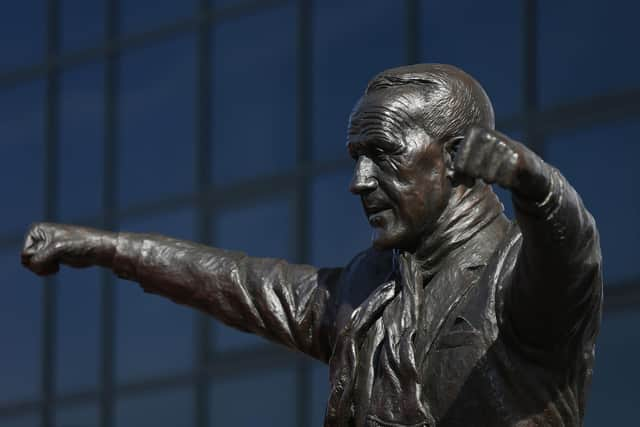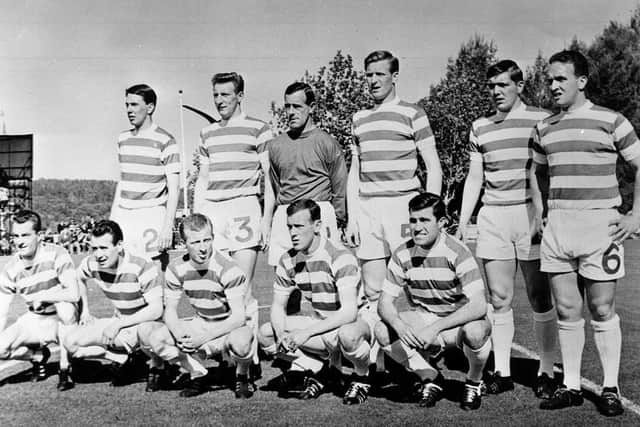Jonny Owen discusses his film ‘The Three Kings’ as he uncovers the stories of three of Scotland’s greatest managers
and live on Freeview channel 276
There are very few figures in British football history that evoke such strong emotions as Sir Matt Busby, Bill Shankly and Jock Stein, so it’s easy to see why ‘The Three Kings’ has earned five-star ratings on Amazon Prime.
Not only does the documentary encapsulate the lasting impact that three of Scotland’s greatest ever sporting names had on the clubs they managed, it also highlights the contribution football made to struggling communities post Second World War, recalling some of the most historic days in British football.
Advertisement
Hide AdAdvertisement
Hide AdThe Three Kings centres around the careers of Liverpool legend Shankly, Celtic great Stein and Manchester United hero Busby, who all famously grew up within a 30-mile radius of one another between Lanarkshire and Ayrshire and outlines how they grew to become the most influential characters in football history.
The film shows how all three managers shared the same values of hard work ethics and togetherness that was a common theme during their humble beginnings, with footage containing passionate success and reflecting on the special relationship all three icons built with their club’s supporters.
So just how did the idea for the film come around?
GlasgowWorld sat down with director Jonny Owen, who explained the premise behind the story.
He said: “My father and my grandfather were obsessed with football from a young age, so I think almost by osmosis, really I became a football fan.
Advertisement
Hide AdAdvertisement
Hide Ad“My father passed in 2017, aged 78 after living with terminal cancer. He worked underground as an electrician, nothing unusual about that in South Wales when I grew up in the mid-1980s.
“I was talking to him one day about what it was like being a miner from a working-class community and he was quick to point out anytime Bill Shankly or Jock Stein were on the television he’d remind me how they were miners too.
“When my father passed, I thought to myself there is a whole generation of men and women that belong to that industrial age, as I call it.
“Glasgow is a good example, so I just thought, ‘Well, you know what? It would be a great way to tell their stories to a younger, new audience.
Advertisement
Hide AdAdvertisement
Hide Ad“I was a big fan of the Hugh McIlvanney series called “The Football Men’, which is probably 35 years old now and I spoke with the producers of Maradona who are good friends of mine, Paul Martin and James Gay-Rees.
“I said to them that I think there’s maybe an opportunity to produce a story on these three icons and they agreed.
“After all, they weren’t just three men that changed football clubs, they changed entire cities and that’s what is remarkable.
“They were they were Colossuses and I was able to get into an area where I was thinking it’s almost impossible to think how important these three figures were for the game and what they achieved was astonishing.”
Advertisement
Hide AdAdvertisement
Hide AdOwen admits the one thing he was surprised to learn throughout producing the film was how Busby, Shankly and Stein all became lifelong friends, despite forging the rivalries we know and enjoy in the present day.
He added: “Shankly was always in Busby’s office or vice versa and they were always talking and Jock Stein would often travel down from Glasgow. They were very, very close friends, but also made a fierce rivalry which I thought was a brilliant part of the story as well.


“Everyone knows Liverpool and Manchester United has become one of the most famous sporting rivalries in the world and that all began with Shankly and Busby in the mid-60s.
“Jock Stein then crosses their path, certainly Liverpool in the 1966 European Cup Winners Cup. I was lucky enough to speak with Ian St. John before he passed away, and he told me how Celtic fans always used to dig him out for the controversial goal he scored in that game.
Advertisement
Hide AdAdvertisement
Hide Ad“I was lucky to grow up in an era when Scottish Football was always on television. The Scottish Cup Final would often be shown right after the English Cup Final so I would always watch that.
“Wales and Scotland always had a fierce rivalry in the late 70s, early 80s not just because of the home internationals but because of the World Cup Qualifiers, so I was very aware of Scottish Football and things my father told me about it being very strong when he was growing up.
“By some quirk, one of my great friends Kevin Devine used to live in Jock Stein’s old house!
“Martin Compston, who is a big Celtic fan, actually put me in touch with a few people at Celtic and I had a wonderful chat with Archie MacPherson, who was a close friend of Jock’s.”
Advertisement
Hide AdAdvertisement
Hide AdStein once famously said: “Football without the fans is nothing.” Owen reckons the bond he created with Celtic supporters epitomised the type of character he was.
He stated: “The Celtic angle for me was the most interesting. I knew about the Lisbon Lions and how every player was born within a certain distance of Celtic Park, but when I really started getting into the depths of the 1966/67 season, I was amazed to read how Celtic won every single competition, from the Glasgow Cup to the European Cup.
“I think Celtic winning the European Cup is one of the greatest achievements ever in the history of the game and something that needs to be recognised because of the way they played against Inter Milan.
“What Jock Stein achieved was nothing short of remarkable. I think he was the greatest domestic football manager that has ever lived, his results alone prove that.
Advertisement
Hide AdAdvertisement
Hide Ad“The style of football his team played, his man-management skills, the community feel he created, it was just astonishing. They beat Inter Milan by out-attacking them almost.
“I always remember four-four-two magazine did a piece on the greatest achievements in the history of football. I think the Celtic story was at number two or three.
“Sir Alex Ferguson said the greatest things that ever happened in the history of football is Jock Stein won the European Cup with a Glasgow District eleven!


“I just thought that was wonderful and a perfect reminder to everyone of what they achieved.
Advertisement
Hide AdAdvertisement
Hide Ad“Jock was a genius and tactically was so sharp. His father was a massive Rangers fan and he couldn’t bring himself to say good luck to his son.
“There’s stories of his close friends not calling him, his wife was catholic, so he is very much part of all that history and the politics of the time.
“Jock was all for one team and he was going to give them everything. I think one of the good things in the film is the relationship between Stein and Celtic supporters which was special and utterly unique.
“Fergie said he would never say a bad word about Celtic, no matter how he was being treated. That comes back to their background and where he came from. Stein, Busby and Shankly were part of a union.”
Advertisement
Hide AdAdvertisement
Hide AdThe film reflects on the personal cost to each manager and the ever-present legacy that they have left behind.
Owen said: “During the filming, I realised the amount of pressure these three men were under and how hard it is being a football manager.
“Matt Busby had obviously survived the Munich Air disaster. He sort of said a few years later, ‘you know what? I’m done.’ Shankly retires out of the blue. He’s like, ‘I can’t take this anymore’ and Jock Stein dies of a heart attack on the side of the pitch.
“The thing about football, unlike any other industry, is when you win or lose the emotions of everybody go up and down.
Advertisement
Hide AdAdvertisement
Hide Ad“You’ve seen that recently with Celtic missing out on ten-in-a-row. The fans were very unhappy after Rangers won the title.
“You would think you’d be happy having won the Treble Treble but that didn’t matter living in the present. Only after five or 10 years can you then reflect on what happened.
“Brian Clough’s last few years at Nottingham Forest were difficult but now he’s hailed as a god there. It’s the same with Busby, Stein and Shankly and they seem to get bigger every year.
“There’s more banners and signs of them at football grounds and the reason they become bigger every year is because more time has passed, and people recognise what they achieved.
Advertisement
Hide AdAdvertisement
Hide Ad“There’s always an end to every empire which is never easy but once few years have passed and the memories have drifted into the history books, everyone can take stalk and go ‘actually, wow. That was amazing.’”
The tragic passing of Stein on September 10, 1985 during a World Cup Qualifier between Scotland and Wales in Cardiff is a night that will live with Owen forever.
Stein had already been suffering from poor health and was under intense pressure at the time.
Owen recalled: “I was there, I went to the game with my father and my grandfather. Wales went one-nil up, but Scotland equalised late in game from a Davie Cooper penalty, and I can remember leaving the ground.
Advertisement
Hide AdAdvertisement
Hide Ad“In those days we had transistor radios, and somebody said have you heard about what happened to Jock Stein? We didn’t have any idea and this person said ‘he’s dead’.
“Obviously, there was an eerie silence amongst the crowd. Stein was hugely admired by Welsh fans.


“There is a photograph before the game where Wales are warming up and one of the balls goes into the Scottish fans and they refuse to give the ball back to Neville Southall.
“Stein goes up to the Scottish fans and asks them to give him the ball back and they threw it back all because Stein had told them to, so you can image the esteem he was held in not just by Scottish football fans but Welsh fans as well.
Advertisement
Hide AdAdvertisement
Hide Ad“I can remember Scotland fans had yellow flags with the lion rampant on them and they stopped waving them. The celebrations seemed to get quieter as word was getting out and then the drive home to my hometown of Mrthyr Tydfil, I can just remember the radio being on and it was all about that story.
“It’s amazing to think the last thing Stein ever did tactically was put on David Cooper who scored the equalising goal. Another tactical masterstroke. What a manager.”
He continued: “In some ways I wish I almost had more time. When I first started making the film, I knew I had to make it roughly like an hour and a half, but I could easily have made six hours’ worth.
“The one thing about these three men in particular (Stein, Busby and Shankly), I didn’t really have the time to talk about their playing careers which were stellar, Busby and Shankly playing together for Scotland etc.
Advertisement
Hide AdAdvertisement
Hide Ad“I loved doing it. I love the fact everyone seems to really enjoy it and I love how the new generation are learning about three great Scottish managers and the history of football.”
The Three Kings has a gala screening at Saint Luke’s on Wednesday 13 October, with tickets from £22.50
Comment Guidelines
National World encourages reader discussion on our stories. User feedback, insights and back-and-forth exchanges add a rich layer of context to reporting. Please review our Community Guidelines before commenting.
